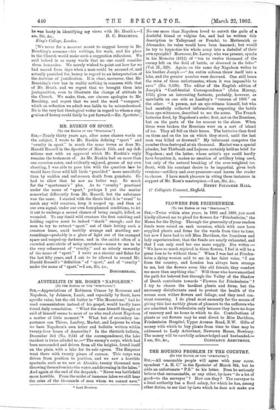AUSTERLITZ IN MR. ROSE'S " NAPOLEON."
[TO THE EDITOR OF TRH "SPECTATOR."] SIR,—Appreciations of Robinson Crusoe by Rousseau and Napoleon, by Johnson, Lamb, and especially by Scott, have specific value, but the old butler in " The Moonstone," had he used commentators instead of his gospel, would hardly have found daily consolation. " What the man himself thought or said of himself seems to most of us who read about Napoleon a matter of little moment."* What but of secondary im- portance can Thiers, Lanfrey, Marbot, and Lejeune be when we have Napoleon's own letter and bulletin written within twenty-four hours of Austerlitz ? In the thirtieth bulletin, December 3rd (No. 9,541 of the correspondence), the lake incident is twice alluded to :—" The enemy's corps, which had been surrounded and driven from all the heights, found itself on the plain, with a lake for its sole egress. The Emperor went there with twenty pieces of cannon. This corps was driven from position to position, and we saw a horrible spectacle, such as we saw at Aboukir, twenty thousand men throwing themselves into the water, and drowning in the lakes." And again at the end of the despatch : " Never was battlefield more horrible. From the midst of immense lakes we still hear the cries of the thousands of men whom we cannot save."
• Lord Rosebery.
No one more than Napoleon loved to outwit the guile of a doubtful friend or vulpine foe, and had he written this description to Talleyrand or Fouche, to Metternich or Alexander, its value would have been lessened ; but would he try to hypnotise his whole army into a disbelief of their own eyesight ? Moreover, Dr. Larrey, who was present, speaks in his Memoirs (1812) of " ten to twelve thousand of the enemy left on the field of battle, or drowned in the lakes" (Vol. II., 329). Again, on the same day Napoleon writes to his brother Joseph :—" An entire column threw itself into a lake, and the greater number were drowned. One still hears the cries of these unfortunates, whom it was impossible to save" (No. 9,538). The editor of the English edition of Joseph's " Confidential Correspondence " (John Murray, 1855) gives an interesting footnote, probably, however, as unreliable on one side as Lanfrey's " veteran of 1805 " on the other. "A person, not an eye-witness himself, but who had carefully collected information respecting the battle from eye-witnesses, described to me the scene. The French batteries fired, by Napoleon's order, first, not on the Russians, but on the parts of the ice nearest to the shore. When these were broken the Russians were on a sort of island of ice. They all fell on their knees. The batteries then fired on them and on the ice on which they stood, until the last man was killed or drowned." My informant computes the number thus destroyed at six thousand. Marbot was a special pleader, but Thiebault and Lejeune certainly held no brief for Napoleon ; and the latter, whose artist's eye could hardly have forgotten it, makes no mention of artillery being used, but only of the natural breaking of the over-weighted ice. Scott, with his constant desire to be impartial, gives both versions—artillery and over-pressure—and leaves the reader to choose. I have much pleasure in citing these instances in support of Mr. Rose's masterpiece.—I am, Sir, &c.,
17 Collegiate Crescent, Sheffield. HENRY FOLJAMBE HALL.










































 Previous page
Previous page